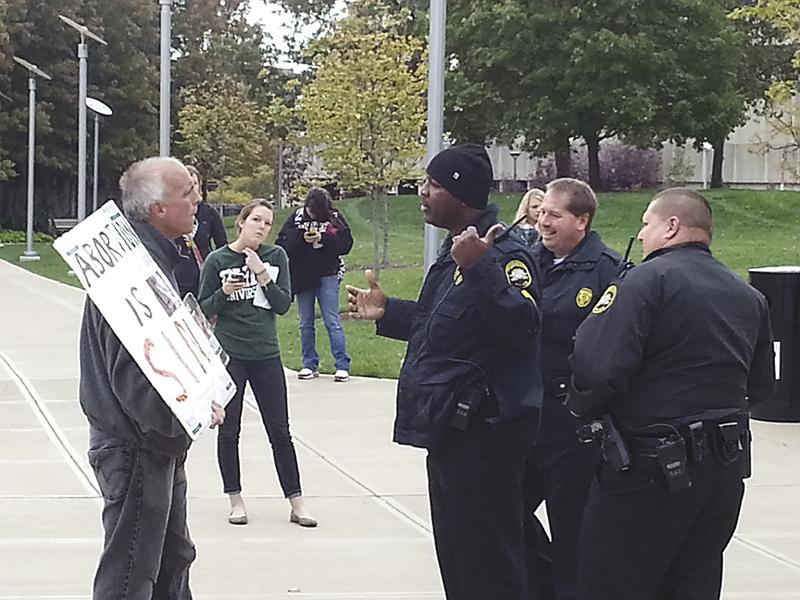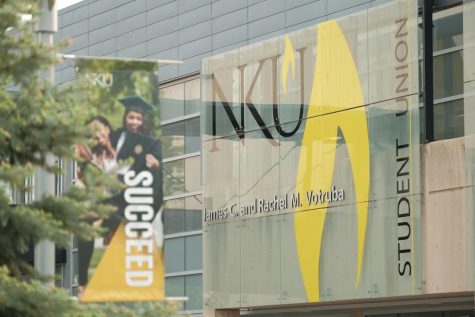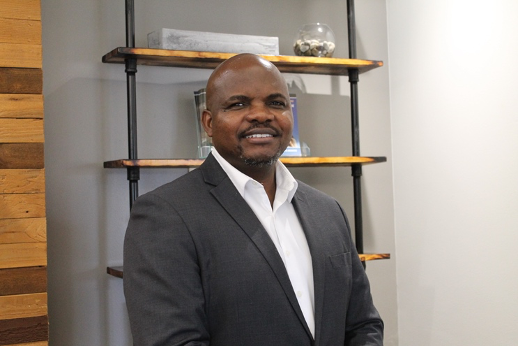Are ‘red-light’ policies restricting students’ internet freedom?
Campus police inform abortion protestor that he needs to relocate to a free speech zone on campus.
The Constitution grants groups across the country the freedom to enter public university campuses to display mutilated fetuses, place simple white crosses in the grass or even shout loud words within a public amphitheater.
In most cases university affiliates are free to do what they want, say what they want and display what they want.
However, according to one group, the Foundation for Individual Rights in Education (FIRE), your freedom of speech may not be so free within the confines of NKU.
The university was one of 250 out of 427 American schools studied to be defined as a “red-light” university with “clear and substantial” free speech restrictions by a recent Foundation for Individual Rights in Education (FIRE) study.
“The courts have said that it’s especially, doubly important for the First Amendment to protect wide-open debate at colleges,” Frank LoMonte, executive director of the Student Press Law Center, said. “That’s the place where you really form your identity as an adult and decide what you believe, and you should be able to test out even plain wacky and far-out ideas without fear that you will be punished.”
Since they interact with a powerful state agency on a daily basis, students have “more skin in the First Amendment game than just about anybody else,” according to LoMonte.
‘Red-light’ universities
Today, universities continue to “restrict free speech and open debate” to various extents around the United States, according to the Foundation for Individual Rights in Education (FIRE), a non-profit organization devoted to defending college student and faculty fundamental freedoms.
Of the 427 schools surveyed, NKU is one of more than 58 percent of universities from FIRE’s 2014 study that have one or more “severely restrictive” speech codes to earn them what the organization deems a “red-light” rating. The percentage of schools with such policies has continued to decline for the sixth year, according to the study.
The red light rating label is for those colleges with a “clear and substantial First Amendment violation,” according to Samantha Harris, FIRE’s speech code research director. This means that the restrictions are “broadly applicable to important categories of campus expression,” or unambiguous free speech infringements that do not depend on how the policy is applied, according to FIRE.
FIRE rates institutions and policies as “red-light,” “yellow-light” or “green-light” based on the amount of restricted speech in their written policies.
NKU’s current Internet usage policies resulted in the university’s “red-light” speech code rating. The Acceptable Use Policy concerns the access or use of university computing resources by all students, faculty, staff and authorized guests.
The scope includes all university “computers, networking, telephone, mobile devices, copiers, media and information resources” and “all information and data maintained in any form and in any medium within the University’s computer resources,” according to the policy.
NKU’s policy section under question states that users may not “engage in activities that harass, degrade, intimidate, demean, slander, defame, interfere with or threaten others.” FIRE identifies this section of the policy as “clearly and substantially” restricting free speech at a public university “legally bound” to protect that freedom.
“Just because it appears on Twitter and not a piece of paper doesn’t change the fact that is constitutionally protected speech,” LoMonte said. “We are going to grow out of this first generation of regulation. I think there is going to be a backlash against schools that try to police their students’ online speech too heavily.”
Of the 323 public institutions in the study, 57.6 percent received a red-light rating while 4 percent received a green-light rating.
“I always tell students they should view their relationship with the college like any other purchase they make in their lives; if you’re not satisfied with the level of customer service then you complain and you get it fixed,” LoMonte said. “If the school is too heavy handed in trying to restrict online speech then students should start being their own advocate.”
Some students find advantages of such restrictions to freedom of speech, such as creating a safe environment for students and helping them not to fall victim to those taking advantage of the system.
“A lot of those things, societally speaking, are not accepted anyway.. Slandering, bullying, intimidating.. You are breaking the law by doing some of those things,” Erik Pederson, Student Government Association president, said. “By having restrictions like that in place.. you are disallowing those people who are opportunistic in a negative fashion.”
Pederson believes at times free speech zones can serve necessary roles on campus grounds.
“Given some of the departments we have here..I think it is appropriate to keep some of the more profane, vulgar, more controversial free speech acts away from the [Early Childhood] Center, but also key points on campus when we are giving tours to younger audiences doing a college visit,” Pederson said.
In last semester, the NKU community witnessed graphic images in the central plaza when the Northern Right to Life student organization invited the Center for Bio-Ethical Reform to campus.
“They [outside speakers] go to campuses because they know college students for the most part are being educated, have resources and will be the next round of voters,” Jeffrey Waple, dean of students, said. “And that’s the next generation that’s going to change the world.”
Freedom of Expression at NKU
Although NKU is designated as a red-light university, FIRE gave the university a green-light rating for their current Free Expression Policy.
“What’s important is students have free speech basically wherever, unless they are part of a group that is going to protest something,” Waple said.
The Dean of Students Office is responsible for the Student Code of Conduct and all policies that affect students, including free speech.
NKU’s Free Expression Policy states, “As an educational community, NKU adheres to the belief that the freedoms of speech, thought, conscience, inquiry and assembly hold central positions among the principles defended by an institution of higher learning.”
This policy covers university members and invited speakers’ expression rights, but the guidelines for uninvited speakers are covered in a separate outside speaker policy, which was added under Waple’s direction three years ago.
As a limited public forum, NKU has the right to execute content neutral regulations that are narrowly tailored to time, place and manner under the Free Expression Policy, according to Sara Kelley, NKU staff attorney.
The restrictions do not depend on words or the message. However, the campus layout can affect and sometimes dictate the different designated zones.
“Because of NKU’s compactness, that became a challenge for us,” Waple said. “So we are fortunate we are able to create these zones, which allow for some flexibility.”
We are not in the “one size fits all” arena anymore, according to Waple. Various spaces at different times need to be allotted for demonstrations depending on details, such as the group size, sound amplification and danger.
For example, demonstrations exceeding 50 individuals may be restricted in size and specific location because they “may represent a reasonable concern for safety, security or reasonable access to campus,” according to the Free Expression policy.
As long as they are not violating the law or interfering with the university community’s job as an educational facility, speakers are allowed to remain on campus without a set time limit, according to Kelley.
As the spaces are first-come, first-serve, everyone is encouraged to submit a request and reservation form to Dean of Students Office.
However, unsponsored outside speakers are required to register at least five business days prior to the request, according to the policy. Those failing to comply with the policies can be removed from campus or found in violation of the law.
“One of the best things about being affiliated with a university is being able to express your free speech and hear other people express their free speech,” Kelley said. “I think you’re almost always a better person from having had the opportunity to listen to something you don’t agree with.”












